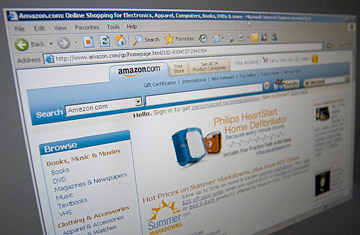
Amazon.com
Amazon executives have to be smiling.
The online retailing giant, unscathed by the recession, is on a tear, posting robust earnings growth while many other retailers are licking their wounds. Analysts believe the company's profitable run isn't over yet, and say that concerns over competition in its trendy e-reader business are overblown.
It's been an "Internet gold rush," in which online retailers that offered merchandise cheaper, faster and more efficiently were the big winners, and Amazon led the way, says Marc Ostrofsky, an Internet consultant and author of "Get Rich Click."
As brick-and-mortar retailers slashed inventories to offset the pullback in demand, shoppers stampeded online to see the full selection at competitive prices, says Keith Jelinek, a director at AlixPartners. "It was definitely a competitive advantage for Amazon," he says. The Seattle-based retailer posted a 40% earnings increase in full-year 2009, with the biggest gain coming in the fourth quarter, where net income shot up 71% — far above Wall Street's expectations.
Amazon didn't just have a broad product selection during the holiday season, it had a firm grasp of the consumers' many needs. Cash-strapped shoppers flocked to the site for its low prices, ready-to-ship inventory, shrewd consumer product reviews, low shipping fees and the holiday season's trendiest gadget, the Kindle. It refused to back down from pricing wars with Walmart and Target over books, and made a big push into electronics to tap the void left by the demise of Circuit City and Tweeter over the past year.
Amazon's sales grew 42% in the fourth quarter, outpacing e-commerce in general, which rose 5% to 10%, according to Colin Sebastian, senior research analyst at Lazard Capital Markets. "Amazon has emerged as the Walmart of the online retail world," says Sebastian.
But it's Amazon's foray into the digital-book business with its groundbreaking Kindle reader that's been making the biggest headlines lately, as sales far exceeded analysts' expectations. Its decision to allow customers to download best-selling books from its e-bookstore to the Kindle for only $9.99 a pop played a big role in stimulating demand. "When we have both [hardcover and e-book] editions, we sell six Kindle books for every 10 physical books," said Jeff Bezos, founder and chief executive of Amazon, in a statement.
However, Kindle's lead and popularity are far from entrenched as the book industry braces for a digital revolution similar to what happened to the music industry more than a decade ago. So far, Amazon's Kindle has had a first-out-of-the-gate advantage over rival e-readers from Sony and Barnes & Noble. But industry experts believe the recent launch of Apple's highly anticipated iPad tablet, a device that offers Web-browsing, e-mail and other laptop functions in addition to an e-reader, could be the Kindle's biggest threat yet. Apple has already signed up five publishers to sell e-books for its iPad. "There's clearly competitive risk," says Mark Mahaney, a managing director at Citigroup.
Ostrofsky believes Amazon will have to revamp and upgrade the Kindle to stay competitive. "My guess is that Jeff [Bezos] is going to have to come out with a color version darn fast — probably faster than he wanted to — because the iPad is going to take market share away," he says. On Feb. 4 the New York Times reported that Amazon had purchased Touchco, a start-up company specializing in touchscreen technology.
For now though, analysts aren't expecting a mad rush to the iPad since the Kindle's $259 price tag is far cheaper than those of the iPad, which will range in price from $499 for the cheapest version to $899 for a model with 3G capability for Internet access anywhere.
Some analysts speculate Amazon will ultimately have to purchase a major player in the digital universe, like Netflix, to prevent falling behind in the movie and book digital transformation as it did when Apple snatched control of the digital-music industry.
